
Journal of Computational Finance
Scope & Guideline
Unlocking new methodologies for modern financial challenges.
Introduction
Aims and Scopes
- Computational Methods in Finance:
The journal emphasizes the development and application of advanced computational techniques in finance, such as Monte Carlo simulations, numerical methods for option pricing, and machine learning algorithms for financial predictions. - Financial Derivatives Pricing:
A core area of focus is on the pricing and hedging of financial derivatives, including options, using various models and methodologies ranging from traditional approaches to cutting-edge neural network applications. - Risk Management and Quantitative Analysis:
The journal addresses risk assessment and management strategies, incorporating quantitative models to evaluate financial risks and optimize trading strategies. - Stochastic Models and Volatility:
Research often explores stochastic models that account for volatility in financial markets, particularly focusing on modeling techniques that reflect market dynamics under uncertainty. - Innovative Financial Technologies:
The journal is committed to exploring the impact of new technologies, including artificial intelligence and machine learning, on financial practices, providing insights into how these innovations can transform quantitative finance.
Trending and Emerging
- Machine Learning and AI in Finance:
Recent publications have shown a significant trend towards the application of machine learning and artificial intelligence techniques in finance, particularly in areas like risk management, option pricing, and algorithmic trading. - Stochastic Differential Equations:
There is an emerging focus on stochastic differential equations as a framework for modeling complex financial systems, highlighting their applicability in various financial contexts, including option pricing and risk assessment. - Multi-Asset and Complex Derivatives Pricing:
The journal is increasingly addressing the pricing of multi-asset options and complex derivatives, reflecting a need for advanced methodologies that can handle the intricacies of modern financial instruments. - Dynamic Risk Management Strategies:
Research is increasingly focusing on dynamic risk management strategies that adapt to market changes, emphasizing real-time decision-making and the integration of computational techniques. - Interdisciplinary Approaches:
There is a growing trend towards interdisciplinary research that combines finance with fields such as data science, statistics, and computational mathematics, enriching the dialogue between these domains.
Declining or Waning
- Traditional Financial Models:
There appears to be a waning interest in purely traditional financial models, such as the Black-Scholes model for options pricing, as newer, more complex models incorporating machine learning and stochastic processes gain traction. - Basic Statistical Techniques:
Methodologies that rely solely on basic statistical techniques for financial analysis are being overshadowed by more sophisticated approaches involving deep learning and advanced computational methods. - Static Risk Assessment Models:
Static models for risk assessment, which do not adapt to changing market conditions, are increasingly being replaced by dynamic models that incorporate real-time data and machine learning for better accuracy. - Non-Computational Approaches to Finance:
There is a noticeable reduction in the publication of papers that do not involve computational techniques, as the journal increasingly prioritizes innovative computational solutions to financial problems.
Similar Journals
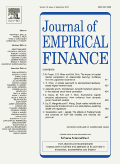
Journal of Empirical Finance
Transforming finance with robust, data-driven analysis.Journal of Empirical Finance, published by Elsevier, stands as a key resource in the areas of finance and economics, with a definitive focus on empirical studies. As a prominent journal since its inception in 1993, it has made significant strides in contributing to the academic community, evidenced by its soaring categorization in Q1 for Finance and Q2 for Economics and Econometrics as of 2023. With an ISSN of 0927-5398 and an E-ISSN of 1879-1727, the journal emphasizes robust, data-driven analysis to inform both theoretical and practical aspects of financial research. While access options do not include open access, the journal ensures that its content remains accessible to a diverse audience of researchers, professionals, and students. It fosters a platform for innovative research and discourse, significantly impacting the fields of finance, economics, and econometrics. The Scopus rankings further bolster its reputation, placing it in the 61st percentile in both categories, reflecting a commitment to high-quality research output. As the journal continues to evolve, it invites contributions that push the boundaries of empirical finance, enabling a deeper understanding of financial mechanisms that drive global economies.
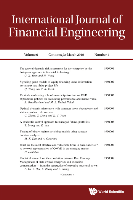
International Journal of Financial Engineering
Connecting theory and practice in financial engineering.The International Journal of Financial Engineering, published by WORLD SCIENTIFIC PUBL CO PTE LTD, is a premier academic journal dedicated to advancing the field of financial engineering. With a ISSN of 2424-7863 and an E-ISSN of 2424-7944, this journal offers a platform for groundbreaking research that intersects finance, mathematics, and computational techniques, promoting innovative solutions to complex financial problems. As a vital resource for researchers, practitioners, and students alike, the journal aims to disseminate cutting-edge methodologies and empirical studies that drive the financial industry forward. While the journal operates under a subscription model, its rigorous peer-review process ensures that only high-quality research is published, maintaining its significance within the academic community. With an ever-growing focus on quantitative finance and derivative pricing, the International Journal of Financial Engineering is essential for those seeking to enhance their understanding of financial markets and engineering.

Annals of Finance
Advancing Financial Knowledge Through Rigorous ResearchThe Annals of Finance, published by Springer Heidelberg in Germany, stands as a pivotal journal within the realms of Economics, Econometrics, and Finance. With a dedicated convergence of research from 2005 to 2024, this esteemed publication features thought-provoking articles that address both theoretical and practical aspects of finance, earning it a commendable Q2 category ranking in the 2023 metrics for both Economics, Econometrics and Finance as well as Finance. The journal serves an essential role in disseminating knowledge and fostering advancements in the field, appealing to researchers, professionals, and students alike. Its rigorous peer-review process ensures the integrity and quality of published works, making it a reliable source for cutting-edge findings and discussions within the finance community. For those looking to navigate the complexities of modern finance through rigorous research, the Annals of Finance is an invaluable resource.

Quantitative Finance and Economics
Unlocking Financial Potential with Data-Driven ResearchQuantitative Finance and Economics, published by the American Institute of Mathematical Sciences (AIMS), is a pioneering open-access journal committed to advancing the fields of finance and economics. Established to disseminate high-quality research, this journal has been an open-access platform since 2017, promoting wider accessibility to vital academic findings. It serves as a crucial resource for researchers and professionals alike, offering valuable insights through rigorous studies in quantitative methods that influence financial and economic decision-making. Although current Scopus rankings indicate emerging challenges, with a rank in the lower percentiles across various categories, Quantitative Finance and Economics strives to gain recognition by bridging theoretical frameworks with practical applications. The journal invites contributions that explore innovative quantitative techniques and their implications in contemporary economic scenarios, thus underscoring its role in shaping discourse and research in this critical sector.
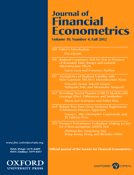
Journal of Financial Econometrics
Exploring the nexus of finance and econometrics.Journal of Financial Econometrics, published by Oxford University Press, stands as a leading academic journal in the fields of financial economics and econometrics. With an impressive impact factor and a ranking in the Q1 quartile for both Economics and Finance categories in 2023, this journal is recognized for its contribution to advancing theoretical and applied methodologies in financial econometric analysis. It publishes high-quality research that addresses critical issues in finance, aiming to foster a deeper understanding of the economic factors influencing financial markets and instruments. Researchers and practitioners alike benefit from its rigorous peer-reviewed articles, which are invaluable resources for both academic scholars and finance professionals. The journal’s content typically spans pioneering techniques in econometric modeling, empirical analysis of financial instruments, and innovative applications of econometric theory in real-world scenarios. Operating out of the United Kingdom, the journal continues to serve as a vital platform for disseminating significant research findings from 2005 to 2024, ensuring that the latest advancements in the field are accessible to its audience.
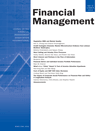
FINANCIAL MANAGEMENT
Connecting Theory and Practice in Financial ManagementFINANCIAL MANAGEMENT is a premier academic journal published by Wiley, focusing on the intricate domains of Accounting, Economics, and Finance. With an ISSN of 0046-3892 and an E-ISSN of 1755-053X, this esteemed journal has made significant contributions to the global discourse on financial practices and theories since its establishment in 1996. Situated within the top tier (Q1) in its respective fields, FINANCIAL MANAGEMENT ranks impressively in Scopus, positioned at 30 out of 176 in Accounting and 57 out of 317 in Finance, reflecting its high impact and relevance in the scholarly community. The journal is known for its rigorous peer-review process and publishes cutting-edge research aimed at advancing knowledge and practice in financial management. Although it does not offer Open Access, it remains accessible through institutional subscriptions, ensuring that researchers, professionals, and students remain at the forefront of developments in financial management. With a commitment to excellence, FINANCIAL MANAGEMENT continues to be an indispensable resource for those seeking to deepen their understanding of this critical field.

JOURNAL OF FINANCIAL ECONOMICS
Advancing financial insights for a sustainable future.Welcome to the JOURNAL OF FINANCIAL ECONOMICS, a premier publication in the realms of finance, economics, and accounting, published by Elsevier Science SA in the Netherlands. With its impactful contributions since 1974, this esteemed journal has earned an impressive impact factor and consistently ranks in the Q1 category across various fields, including Accounting, Economics and Econometrics, Finance, and Strategy and Management. Researchers can access cutting-edge studies that delve into both theoretical frameworks and empirical analyses, crucial for advancing financial literacy and economic policies globally. With remarkable Scopus rankings, notably placing #2 in Accounting and #6 in Finance, the journal serves not only as a reliable resource for academics but also as a vital tool for professionals seeking to stay abreast of the latest financial trends and insights. Engage with the latest research and contribute to the dialogue shaping the future of financial economics!

FINANCE AND STOCHASTICS
Pioneering Research in Financial StochasticsFinance and Stochastics is a leading academic journal published by Springer Heidelberg, focusing on the intricate interplay of finance, probability, and statistics. With an impressive impact factor and ranked within the Q1 category in both finance and statistics, it serves as an essential resource for researchers and professionals seeking to advance their understanding of stochastic modeling in financial contexts. The journal has maintained a strong reputation since its inception, with contributions from renowned scholars worldwide. The editorial team prioritizes high-quality research that addresses contemporary challenges in financial mathematics and extends the boundaries of statistical methods. Nestled in the heart of Germany, Finance and Stochastics embraces a broad scope, inviting submissions that explore innovative approaches to economic theory and quantitative methodologies. This combination of rigorous academic standards and commitment to impactful research makes the journal a pivotal avenue for disseminating knowledge and fostering collaboration in the finance and statistics communities.
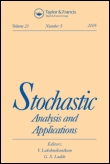
STOCHASTIC ANALYSIS AND APPLICATIONS
Elevating research in stochastic analysis to new heights.STOCHASTIC ANALYSIS AND APPLICATIONS is a prestigious peer-reviewed journal published by Taylor & Francis Inc, dedicated to advancing the field of stochastic processes and their applications across various disciplines. With an ISSN of 0736-2994 and an E-ISSN of 1532-9356, this journal has established itself as a vital resource for researchers and practitioners, offering high-quality articles that address both theoretical and practical aspects of stochastic analysis. As of 2023, the journal holds a commendable Q2 rank in the fields of Applied Mathematics, Statistics and Probability, and Statistics, Probability and Uncertainty, reflecting its significant impact in these domains. The journal is indexed in Scopus and ranks in the top percentiles for its categories, making it an essential read for scholars interested in the latest developments in stochastic methods and their real-world implications. Although it does not offer open access, the journal ensures that its contents are widely disseminated within academia, fostering knowledge that drives innovation and application in various sectors.

Review of Derivatives Research
Catalyzing Scholarly Dialogue in Finance and EconomicsThe Review of Derivatives Research, published by SPRINGER, stands as a pivotal platform for the dissemination of innovative research in the fields of derivatives, finance, and economics. Established in 1996, this journal provides deep insights into the theoretical and practical aspects of derivatives markets, catering to a diverse audience comprising researchers, practitioners, and academics. With an impact factor that reflects its significance in the scholarly community, it currently holds a Q2 ranking in the Economics, Econometrics and Finance (miscellaneous) category and a Q3 ranking in Finance, demonstrating its relevance and influence within these fields. Although it does not offer an open-access model, the Review of Derivatives Research remains an essential resource for those seeking to advance their understanding of complex financial instruments and market dynamics from 2002 to 2024. The journal's dedicated focus on the intricacies of derivatives paves the way for significant contributions to both academic research and practical applications in finance.